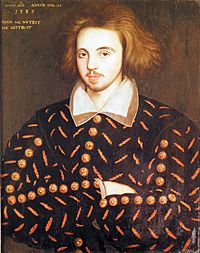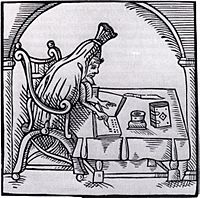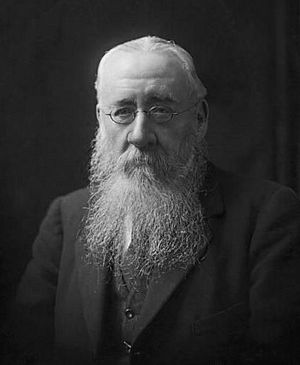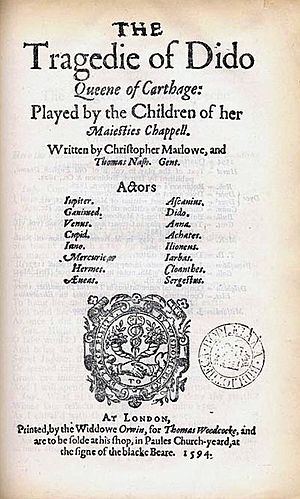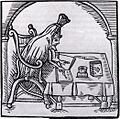University Wits facts for kids
The University Wits were a group of talented English writers in the late 1500s. They were called "Wits" because they were very smart and creative. Most of them studied at famous universities like Oxford or Cambridge. These writers became very popular for their plays and short books called pamphlets.
Some of the most well-known University Wits were Christopher Marlowe, Robert Greene, and Thomas Nashe from Cambridge University. From Oxford University, there were John Lyly, Thomas Lodge, and George Peele. Sometimes, Thomas Kyd is also included, even though he didn't go to Oxford or Cambridge.
These writers were among the first people in England to make a living just by writing. They helped create the exciting period of theatre in England known as the Elizabethan Renaissance. Their work helped prepare the way for famous playwrights like William Shakespeare.
Contents
Who Coined the Term "University Wits"?
The name "University Wits" wasn't used when these writers were alive. It was created much later by a writer named George Saintsbury. He was a journalist and author in the 1800s.
Saintsbury believed that the University Wits took ideas from earlier, simpler plays. They combined these with their own clever ideas to create powerful new dramas. He said that the Wits, especially Marlowe, made a special kind of poetry for plays called "blank verse." This helped English plays become more realistic and exciting.
However, Saintsbury also thought that the Wits didn't make their characters seem completely real. He felt that later writers, like Shakespeare, added their own stage experience. With Shakespeare's help, they created some of the world's greatest plays.
Many writers in the 1900s started using the term "University Wits." They often agreed with Saintsbury's ideas about how plays developed. For example, Adolphus William Ward wrote that the Wits were very proud of their university education. He said they had "valuable ideas and literary methods."
What Made the University Wits Special?
These writers had a new kind of education called "Humanistic education." This helped them write plays that connected with people. Their plays often talked about big changes happening in England at the time.
Robert Greene, one of the Wits, is sometimes called the "first famous professional writer." This means he was one of the first to earn a living just from his writing.
Did the University Wits Argue with Shakespeare?
There's a famous story about a pamphlet called Greene's Groats-Worth of Wit. This pamphlet was published after Robert Greene died. It seemed to attack Shakespeare, calling him an "upstart crow." This made some people think that the University Wits were jealous of Shakespeare. They believed the Wits didn't like that Shakespeare became famous without a university education.
However, many experts now think that another writer, Henry Chettle, actually wrote that part of the pamphlet. In the pamphlet, "Greene" warns his fellow writers (thought to be Peele, Marlowe, and Nashe) about a new writer. This new writer was supposedly "beautified with our feathers," meaning he was using their ideas.
Some people have imagined a big "war" between the university-educated writers and the actors like Shakespeare. But many experts disagree. They say that the University Wits often praised actors. They were also happy to work together on plays.
Images for kids
 | Ernest Everett Just |
 | Mary Jackson |
 | Emmett Chappelle |
 | Marie Maynard Daly |


